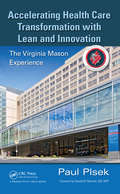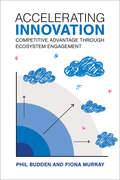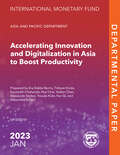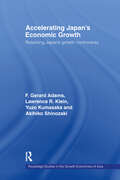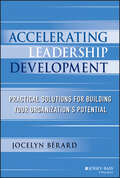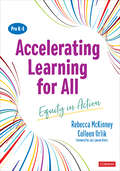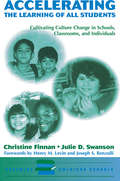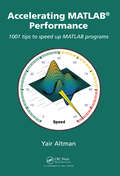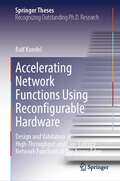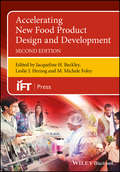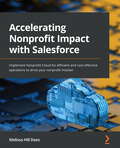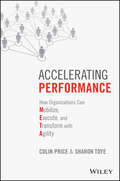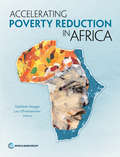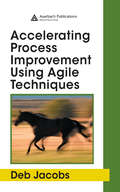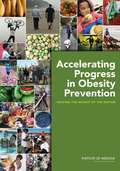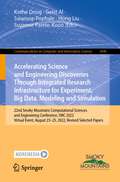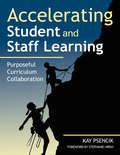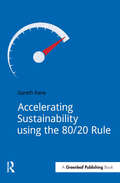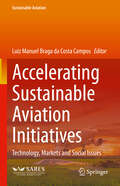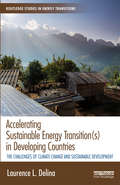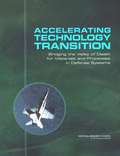- Table View
- List View
Accelerating Health Care Transformation with Lean and Innovation: The Virginia Mason Experience
by Paul E. PlsekAccelerating Health Care Transformation with Lean and Innovation: The Virginia Mason Experience describes how Virginia Mason Medical Center (VMMC) has systematically integrated innovative structures, methods, and cultural practices into its implementation of Lean. Describing how an organization can create a strategy and build a culture of innovation and learning, it supplies concrete examples that show how Lean and innovation can work hand-in-hand to improve and transform value streams. It also explains how to use the voices of patients and their families to drive improvement and innovation.
Accelerating Innovation: Competitive Advantage through Ecosystem Engagement (Management on the Cutting Edge)
by Phil Budden Fiona MurrayA practical handbook for accelerating innovation, both internally and externally, through engagement with innovation ecosystems.Leaders in large organizations face continuous pressure to innovate, and few possess all the internal resources needed to keep up with rapid advances in innovation, science, and technology. But looking beyond their own organizations, most face a bewildering landscape of external resources. In Accelerating Innovation, these leaders—whether from the private, public, or nonprofit sectors—will find a practical guide to this external landscape. Authors Phil Budden and Fiona Murray provide directions for navigating innovation ecosystems—those hotspots worldwide where researchers, entrepreneurs, and investors congregate.While Silicon Valley and Greater Boston are popularly known for web-based digital technology and biotechnology, respectively, the logic of innovation ecosystems is not solely American—so this guide takes in new locations and varied sectors such as Singapore (smart cities), Perth (mining), Cairo and Dubai (fintech), London and Lagos (fintech and media), Copenhagen (quantum computing), Rio de Janeiro (energy), Halifax (oceans), and Tel Aviv (cybersecurity). Drawing practical advice from a synthesis of works on tech, innovation, entrepreneurship, and strategic management, and from a decade of their own research and teaching at the intersection of these topics, Budden and Murray distill insights and interconnections from all these different worlds into a useful and globally applicable set of frameworks and models. Their approach provides leaders at every organizational level with a clear and workable roadmap for making the most of the unique resources of innovation ecosystems.
Accelerating Innovation and Digitalization in Asia to Boost Productivity
by SollaciA report from the International Monetary Fund.
Accelerating Japan's Economic Growth: Resolving Japan's Growth Controversy (Routledge Studies in the Growth Economies of Asia)
by Lawrence R. Klein F. Gerard Adams Kumasaka Yuzo Shinozaki AkihikoThe Japanese economy is beginning to show signs of recovery after years of stagnation/deflation, but many Japanese policymakers warn that this economic growth may be sluggish: slower than in the United States and certainly slower than in other East Asian countries. Japan faces significant economic problems, including an aging population, a large fiscal deficit, and the need to adjust to the IT economy and to competition with the rest of East Asia. A slow growth scenario would greatly reduce opportunities for new productive investment and would make it increasingly difficult to provide for Japan's growing social needs. The authors of this book argue that Japan can and should grow more rapidly, and examine the reasons for the sluggish performance of the Japanese economy. For example, some Japanese economic sectors, particularly in distribution and finance, have failed to take advantage of new information and communications technology to accelerate the growth of productivity, as has happened in other countries, such as the US. Production function studies and econometric model simulations suggest that with appropriate policies the Japanese economy can grow more rapidly and deal with its future problems. The book posits a number of policy proposals which would help to accelerate Japan's economic growth This book will be of interest to students of the Japanese economy, macroeconomics and international economies, and also to policymakers and professionals interested in Japan’s economy.
Accelerating Leadership Development
by Jocelyn BerardProven strategies and innovative solutions for developing and retaining successful leadersMany organizations today are facing a crisis of leadership. As the Baby Boomer generation exits the workforce, companies are struggling to find qualified leaders to fill critical roles. Accelerating Leadership Development offers solutions for leadership development, management, and retention from award-winning development firm Global Knowledge.Accelerating Leadership Development provides a proven model to help companies develop high-potential employees with the competencies and knowledge capital to assume critical roles successfully. It includes practical and rigorous tools that enable organizations to identify targets and predict those targets' success with six measurable factors. With this proven development system, companies can develop a pipeline of ready leaders with high levels of engagement and retention.Features actionable, effective principles and strategies for leadership development using a results-oriented frameworkChapters address communication and delegation strategies, effective feedback models, shifting of responsibility and accountability to direct reports, and contemporary coaching and development approachesBased on in-depth research and client interactions from one of the most prominent names in workforce developmentFor any business that experiences a leadership failure or a lack of qualified leaders for vital positions, the consequences can be devastating. This practical and effective guide to leadership development offers real solutions for long-term excellence.
Accelerating Learning for All, PreK-8: Equity in Action
by Rebecca McKinney Colleen UrlikEnsure high expectations and engaging learning experiences for all students Providing all students with authentic experiences focused on strengths and learning progression—not deficits and gap filling—can change their trajectory. It’s time to use strategies typically reserved for advanced and gifted learners to advance all students’ learning. Designed to support equitable access and opportunities through rigorous and engaging assessment, curriculum, and instruction, Accelerating Learning for All, PreK-8, provides strategies to move all students towards becoming independent critical thinkers and problem-solvers—a goal that should not be contingent on background, assessment performance, or zip code. Packed with evidence-based practices and culturally responsive teaching methods, this book includes: Strategies to support diverse learners and develop student voice Support for social emotional learning Tools, prompts, and exercises The current educational environment is ripe for change. Authors McKinney and Urlik help teachers put equity into action with strategies proven to deepen and accelerate learning for all.
Accelerating Learning for All, PreK-8: Equity in Action
by Rebecca McKinney Colleen UrlikEnsure high expectations and engaging learning experiences for all students Providing all students with authentic experiences focused on strengths and learning progression—not deficits and gap filling—can change their trajectory. It’s time to use strategies typically reserved for advanced and gifted learners to advance all students’ learning. Designed to support equitable access and opportunities through rigorous and engaging assessment, curriculum, and instruction, Accelerating Learning for All, PreK-8, provides strategies to move all students towards becoming independent critical thinkers and problem-solvers—a goal that should not be contingent on background, assessment performance, or zip code. Packed with evidence-based practices and culturally responsive teaching methods, this book includes: Strategies to support diverse learners and develop student voice Support for social emotional learning Tools, prompts, and exercises The current educational environment is ripe for change. Authors McKinney and Urlik help teachers put equity into action with strategies proven to deepen and accelerate learning for all.
Accelerating The Learning Of All Students: Cultivating Culture Change In Schools, Classrooms And Individuals (Renewing American Schools Ser.)
by Christine FinnanIsn't acceleration just for gifted kids? This is a common assumption when we think about who benefits from efforts to accelerate student learning. For generations, students identified as gifted have been separated from other students and provided enriched learning opportunities many adults believe would be wasted on other students. More recently, in response to failed efforts to remediate low-achieving students, the term has been extended to efforts to reverse the negative effects of grade retention for many low-achieving students. The most promising application of the term involves efforts to extend the curriculum and instruction usually reserved for gifted students to all students.Accelerating the Learning of All Students: Cultivating Culture Change in Schools, Classrooms, and Individuals explores the multiple applications of the term "acceleration" and the assumptions that shape schools, classrooms, and individuals that encourage and discourage efforts to accelerate the learning of all students. This book begins with an exploration of the multiple definitions of acceleration, examining the social and historical context that led to an emphasis on labeling and sorting students. Descriptions of exemplary programs geared to each group of students provide useful ideas for addressing special needs of students. These descriptions also illustrate the wisdom of providing a rich, challenging learning experience to all students rather than focussing on separating them for special instruction. The book proceeds to explore the conditions in schools and classrooms that facilitate or hinder efforts to accelerate learning of all students. Focusing on the importance of changing individuals' assumptions about students, adult roles in schools, acceptable educational practices, appropriate communication patterns and the value of change, the book ends with a challenge to all of us to assume responsibility for making schools a better place for all students. Written by authors who bring a wealth of experiences to this topic, Christine Finnan and Julie D. Swanson draw on their own research and experience and on current research to provide a much-needed exploration of issues surrounding efforts to effectively educate all students. Accelerating the Learning of All Students provides hope to all citizens and educators that the dismal history of educating low-income students can be turned around, and that all students can be provided the rich, engaging educational experience that has historically been reserved only for those identified as gifted.
Accelerating MATLAB Performance: 1001 tips to speed up MATLAB programs
by Yair M. AltmanThe MATLAB programming environment is often perceived as a platform suitable for prototyping and modeling but not for "serious" applications. One of the main complaints is that MATLAB is just too slow. Accelerating MATLAB Performance aims to correct this perception by describing multiple ways to greatly improve MATLAB program speed. Packed with tho
Accelerating Medical Evidence Generation and Use: Summary Of A Meeting Series
by National Academy of Medicine The Learning Health System SeriesIn 2016, the National Academy of Medicine (NAM) hosted a series of meetings, which was sponsored by the Patient-Centered Outcomes Research Institute, with support from NAM's Executive Leadership Network. The series underscored the importance of partnerships between researchers and health system leadership and considered opportunities to build institutional capacity, cross-institutional synergy, and system-wide learning. During these meetings, health system executives, researchers, and others discussed building infrastructure that simultaneously facilitates care delivery, care improvement and evidence development. The vision is a digital system-wide progress toward continuous and seamless learning and improvement throughout health and health care. This publication aims to answer the following questions: How can evidence development be accelerated, given current knowledge and resources? What might that mean for better outcomes for patients and greater efficiency in health care? What system and culture changes are required to generate evidence from the care experience? How much progress has been made in preparing the field for the paradigm shift? What are the hallmarks of successful partnerships among care executives and research leaders? What are the priorities in advancing executive leadership to the next level for continuously learning health and health care?
Accelerating Network Functions Using Reconfigurable Hardware: Design and Validation of High Throughput and Low Latency Network Functions at the Access Edge (Springer Theses)
by Ralf KundelThis book reports on new concepts and methods to design network functions on programmable hardware to accelerate connectivity. First, it introduces the host bypassing concept for improved integration of hardware accelerators in computer systems operating 5G radio access networks. This novel concept bypassed the system’s main memory and established direct connectivity between the accelerator and network interface card. This concept leads to improved throughput and significantly lowered latency jitter compared to existing methods. Second, the book analyzes different programmable hardware technologies for hardware-accelerated Internet subscriber handling, including three P4-programmable platforms and FPGAs. It shows that all the approaches have excellent performance and are suitable for Internet access creation. In turn, it presents a fully-fledged accelerated User Plane Function (UPF) designed upon these concepts and its testing in an end-to-end 5G standalone network. Third, it analyses and demonstrates the usability of Active Queue Management (AQM) algorithms on programmable hardware as an expansion to the access edge. It shows the feasibility of the CoDel AQM algorithm and discusses the challenges and constraints to be considered when limited hardware is used, resulting in significant improvements in the Quality of Service. Furthermore, the P4STA measurement framework is introduced, a network function benchmarking concept combing precise hardware-based time measurement methods with software-based load generation to simultaneously ensure high measurement accuracy and flexibility. Researchers and professionals will find in this book new solutions to improve both fixed and mobile internet access networks, offering an informative and inspiring reading for researchers and professionals involved in building the next generation of access edge networks and underlying technology.
Accelerating New Food Product Design and Development
by M. Michele Foley Leslie J. Herzog Jacqueline H. BeckleyWritten primarily for directors and managers of food design and development, food scientists, technologists, and product developers, this book explains all the necessary information in order to help meet the increasing demands for innovation in an industry that is providing fewer resources. This updated edition, by a group of seasoned food industry business professionals and academics, provides a real-world perspective of what is occurring in the food industry right now, offers strategic frameworks for problem solving and R&D strategies, and presents methods needed to accelerate and optimize new product development. Accelerating New Food Product Design and Development, Second Edition features five brand new chapters covering all the changes that have occurred within the last decade: A Flavor Supplier Perspective, An Ingredient Supplier Perspective, Applying Processes that Accelerate New Product Development, Looking at How the University Prepares Someone for a Career in Food, and Innovative Packaging and Its Impact on Accelerated Product Development. Offers new perspectives on what really goes on during the development process Includes updated chapters fully describing the changes that have occurred in the food industry, both from a developer’s point of view as well as the consumer requirements Features a completely rewritten chapter covering the importance of packaging which is enhanced through 3D printing All of this against the impact on speed to market Filled with unique viewpoints of the business from those who really know and a plethora of new information, Accelerating New Food Product Design and Development, Second Edition will be of great interest to all professionals engaged in new food product design and development.
Accelerating Nonprofit Impact with Salesforce: Implement Nonprofit Cloud for efficient and cost-effective operations to drive your nonprofit mission
by Melissa Hill DeesDrive digital transformation for nonprofits with well-organized volunteer management, donor engagement, fundraising, and grantmaking using the intelligent and powerful capabilities of Salesforce Nonprofit CloudKey FeaturesImplement NPSP modules to scale varied business operations in nonprofitsAdminister and automate business processes and tasks with NPSP for nonprofitsCustomize and extend the standard functionalities of Nonprofit Cloud and NPSP as per client needs, resources, and critical outcomesBook DescriptionSalesforce Nonprofit Cloud enables a 360-degree view of people related to your nonprofit to connect fundraising, program management, and grantmaking. With a single, unified view of every interaction with constituents, nonprofits can create strong relationships with the community and streamline internal processes. The book starts by covering the tools and features that make up Nonprofit Cloud, helping you understand their standard functionalities and how Nonprofit Success Pack's (NPSP) data architecture is critical to implementation. You'll learn how the Nonprofit Cloud Program Management Module can connect your programs, automate case management, and track client progress. Next, you'll explore the tools for creating a change management process to increase user adoption. Moving ahead, you'll understand how to configure necessary permissions for NPSP administration and explore how declarative tools help better align the goals of a nonprofit organization. Toward the concluding chapters, you'll cover customizations, deployment, custom reports, and dashboards for fundraising analytics, as well as best practices for data management to maintain its integrity. By the end of this Salesforce book, you'll be able to build and configure the Nonprofit Cloud for a variety of use cases to achieve maximum social impact with the least amount of technical debt.What you will learnImplement various components and modules in Nonprofit CloudImplement tools for grantmaking, program management, and case managementExtend the standard functionalities of Nonprofit Cloud and NPSPIdentify and use success metrics to prioritize goals and outcomes for implementationExplore the tools that Nonprofit Cloud offers for testing and deploymentBuild custom reports and dashboards for NPSP and use Tableau dashboard starters for fundraising analyticsUnderstand best practices for data management to maintain data accuracy and data integrityWho this book is forThis book is for technical consultants, functional consultants, and Salesforce architects who are working with nonprofit organizations and want to implement different functionalities within Nonprofit Cloud and NPSP optimally for business processes and tasks in their organizations. Salesforce administrator skills and overall proficiency with Salesforce are required to get the most out of this book.
Accelerating Performance: How Organizations Can Mobilize, Execute, and Transform with Agility
by Colin Price Sharon ToyeTransform your organization into a dynamic catalyst for success Accelerating Performance is not just another “warm and fuzzy” change management book—it's a practical, comprehensive, data-driven action plan for picking up the pace and achieving more. Co-written by one of the authors of Beyond Performance, this book draws on a combination of empirical research and decades of experience advising global companies to show you how to reduce time to value by building and changing momentum more quickly than your competitors. The META framework (short for Mobilize, Execute, and Transform with Agility) offers advice for leading change at four levels: strategy, the organization, teams, and individuals. In addition to step-by-step guidance toward assessment, planning, and implementation, the book offers: A diagnostic tool for leaders, teams, and organizations to assess their starting place, and highlight the specific areas needed to improve the ability to accelerate performance. A detailed look at the factors proven to create drag—and drive—at each of the four levels: strategy, organizations, teams, and individuals. An exploration of the 39 differentiating actions that organizations can combine as dictated by their strategy and context into a winning recipe. A closer look at the practices of 23 “superaccelerators,” a global (and perhaps unexpected) mix of companies that have demonstrated a consistent ability to accelerate performance. A single taste of success is all it takes to spark change, but the hard work of following through requires constant vigilance—and a plan. Learn how to capture that drive, bottle it, and use it to sustain motivation, inspiration, and achievement. Deliver at the highest level, and then turn around and do even better next time. Accelerating Performance gives leaders a step-by-step framework for taking action and transforming their organizations, teams, and even themselves—starting today.
Accelerating Poverty Reduction in Africa
by Kathleen Beegle Luc ChristiaensenSub-Saharan Africa's turnaround over the past couple of decades has been dramatic. After many years in decline, the continent's economy picked up in the mid-1990s. Along with this macroeconomic growth, people became healthier, many more youngsters attended schools, and the rate of extreme poverty declined from 54 percent in 1990 to 41 percent in 2015. Political and social freedoms expanded, and gender equality advanced. Conflict in the region also subsided, although it still claims thousands of civilian lives in some countries and still drives pressing numbers of displaced persons. Despite Africa’s widespread economic and social welfare accomplishments, the region’s challenges remain daunting: Economic growth has slowed in recent years. Poverty rates in many countries are the highest in the world. And notably, the number of poor in Africa is rising because of population growth. From a global perspective, the biggest concentration of poverty has shifted from South Asia to Africa. Accelerating Poverty Reduction in Africa explores critical policy entry points to address the demographic, societal, and political drivers of poverty; improve income-earning opportunities both on and off the farm; and better mobilize resources for the poor. It looks beyond macroeconomic stability and growth—critical yet insufficient components of these objectives—to ask what more could be done and where policy makers should focus their attention to speed up poverty reduction. The pro-poor policy agenda advanced in this volume requires not only economic growth where the poor work and live, but also mitigation of the many risks to which African households are exposed. As such, this report takes a "jobs" lens to its task. It focuses squarely on the productivity and livelihoods of the poor and vulnerable—that is, what it will take to increase their earnings. Finally, it presents a road map for financing the poverty and development agenda.
Accelerating Process Improvement Using Agile Techniques
by Deb JacobsAccelerating Process Improvement Using Agile Techniques explains how agile programming is applied to standard process improvement. By applying agile techniques, IT organizations can speed up process improvement initiatives, minimize the resources these initiatives require, and maximize the benefits of process improvement. The book details st
Accelerating Progress in Obesity Prevention: Solving the Weight of the Nation
by Committee on Accelerating Progress in Obesity PreventionOne-third of adults are now obese, and children's obesity rates have climbed from 5 to 17 percent in the past 30 years. The causes of the nation's obesity epidemic are multi-factorial, having much more to do with the absence of sidewalks and the limited availability of healthy and affordable foods than a lack of personal responsibility. The broad societal changes that are needed to prevent obesity will inevitably affect activity and eating environments and settings for all ages. Many aspects of the obesity problem have been identified and discussed; however, there has not been complete agreement on what needs to be done to accelerate progress. Accelerating Progress in Obesity Prevention reviews previous studies and their recommendations and presents five key recommendations to accelerate meaningful change on a societal level during the next decade. The report suggests recommendations and strategies that, independently, can accelerate progress, but urges a systems approach of many strategies working in concert to maximize progress in accelerating obesity prevention. The recommendations in Accelerating Progress in Obesity Prevention include major reforms in access to and opportunities for physical activity; widespread reductions in the availability of unhealthy foods and beverages and increases in access to healthier options at affordable, competitive prices; an overhaul of the messages that surround Americans through marketing and education with respect to physical activity and food consumption; expansion of the obesity prevention support structure provided by health care providers, insurers, and employers; and schools as a major national focal point for obesity prevention. The report calls on all individuals, organizations, agencies, and sectors that do or can influence physical activity and nutrition environments to assess and begin to act on their potential roles as leaders in obesity prevention.
Accelerating Science and Engineering Discoveries Through Integrated Research Infrastructure for Experiment, Big Data, Modeling and Simulation: 22nd Smoky Mountains Computational Sciences and Engineering Conference, SMC 2022, Virtual Event, August 23–25, 2022, Revised Selected Papers (Communications in Computer and Information Science #1690)
by Kothe Doug Geist Al Swaroop Pophale Hong Liu Suzanne Parete-KoonThis book constitutes the refereed proceedings of the 22nd Smoky Mountains Computational Sciences and Engineering Conference on Accelerating Science and Engineering Discoveries Through Integrated Research Infrastructure for Experiment, Big Data, Modeling and Simulation, SMC 2022, held virtually, during August 23–25, 2022. The 24 full papers included in this book were carefully reviewed and selected from 74 submissions. They were organized in topical sections as follows: foundational methods enabling science in an integrated ecosystem; science and engineering applications requiring and motivating an integrated ecosystem; systems and software advances enabling an integrated science and engineering ecosystem; deploying advanced technologies for an integrated science and engineering ecosystem; and scientific data challenges.
Accelerating Student and Staff Learning: Purposeful Curriculum Collaboration
by Kay Psencik"This book brings new focus to the rich history of ideas and strategies shown to improve student learning, helping educators at all levels see not only the value of using proven strategies, but the importance of integrating those strategies into purposeful improvement efforts."—Thomas R. Guskey, Distinguished Service ProfessorGeorgetown College"This is a book of action. The author calls for leaders in school communities to be bold, courageous, committed, and aggressive in the actions required to achieve desired increases in student learning."—Charles Patterson, Educational ConsultantFormer President, Association for Supervision and Curriculum DevelopmentDramatically raise student achievement by engaging educators in collaborative curriculum design and professional development!Teachers, teacher leaders, principals, and staff developers can build a collaborative culture and improve staff and student performance with this content-focused, step-by-step model that ties curriculum design to teacher growth. Kay Psencik provides a powerful process whereby teachers work together in teams to examine standards, gain a deep understanding of content, create curriculum maps, and design common formative assessments. Professional development leaders can inspire and challenge teachers to:Confront assumptions about learning and professional development Clarify and establish complex standardsEmbed conversations about the curriculum into daily workWith hands-on tools, templates, and resources, readers can help teachers become more skilled in their instruction, create a school-based curriculum that is tied to standards, and accelerate the learning of both students and staff.
Accelerating Sustainability in Fashion, Clothing and Textiles
by Martin Charter Bernice Pan Sandy BlackThe issue of sustainability is characterised as a ‘wicked problem’ in the fashion, clothing and textiles sector and is now coming into increased focus due to growing consumer, business and policy pressures. This in-depth volume presents a comprehensive overview of the challenges and emerging opportunities faced by the sector, and provides strategic solutions as to how the sector can substantially accelerate sustainability. This book collates research and industry best practice to provide a ‘one-stop shop’ exploring the complex and interconnected issues surrounding sustainability in fashion, clothing and textiles. The practical and digestible chapters include innovative examples and perspectives from different regions of the globe, addressing topics from policies to supply chain issues and materials innovation. Five unique case studies of sustainable businesses provide detailed examples of pioneering practice. Edited by three professionals with long-standing knowledge and expertise, the book takes a global perspective with examples that illustrate the scale and breadth of topics and regions in the scope of sustainability. This holistic approach brings together both academic and industry perspectives on the critical areas that require immediate action to move towards a more sustainable fashion, clothing and textile sector. This is an invaluable resource for those working in the industry, policymakers and for those in business or academia with an interest in sustainability in fashion, clothing, textiles and related sectors worldwide. It is also relevant to professionals and students in the areas of sustainability, innovation, supply chains, design and development, consultancy, education and training.
Accelerating Sustainability Using the 80/20 Rule
by Gareth KaneAre your sustainability efforts making as much impact as they could be?With our collective way of life rubbing up against the natural limits of the planet, it does not take a genius to see that it is time to scrape the mud off our boots and find a shorter, smarter path towards sustainability – a way to maximize our effectiveness and inspire leaps forward in sustainability, rather than incremental steps. The 80/20 rule says that, in many situations, a small number of inputs determine the vast majority of our desired results. If we identify these “vital few” inputs in our sustainability efforts, and focus on them, we can maximize our effectiveness and accelerate progress rapidly. This book will help you to think about sustainability from an 80/20 perspective with practical applications for: product and service development; supply chains; materiality, indicators and quantitative analysis; waste, energy efficiency, water conservation and transport; employee engagement and sustainability strategy. If you want to focus on what works, deliver better results, waste less time on “switch it off” stickers and ineffective “standard practice” and start making a real difference, then this book is for you!
Accelerating Sustainable Aviation Initiatives: Technology, Markets and Social Issues (Sustainable Aviation)
by Luiz Manuel Braga da Costa CamposAccelerating Sustainable Aviation Initiatives: Markets, Economics, and Social Issues examines the twin challenges of clean aviation and the industry’s ongoing recovery from the COVID-19 crisis. The book looks at integrated technologies and societal issues driving aircraft design, certification, operational performance, maintenance, and safety. Coverage includes emerging technologies for low emissions and the evolution of aircraft fleets toward zero environmental impact, the effects of COVID-19, and economic efficiency and market implications of renewing current fleets to meet environmental targets. The book will be of keen interest to professionals and researchers interested in emerging technologies for clean aviation and the industry’s emergence from the COVID-19 crisis.
Accelerating Sustainable Energy Transition: The challenges of climate change and sustainable development (Routledge Studies in Energy Transitions)
by Laurence L DelinaAccelerating sustainable energy transitions away from carbon-based fuel sources needs to be high on the agendas of developing countries. It is key in achieving their climate mitigation promises and sustainable energy development objectives. To bring about rapid transitions, simultaneous turns are imperative in hardware deployment, policy improvements, financing innovation, and institutional strengthening. These systematic turns, however, incur tensions when considering the multiple options available and the disruptions of entrenched power across pockets of transition innovations. These heterogeneous contradictions and their trade-offs, and uncertainties and risks have to be systematically recognized, understood, and weighed when making decisions. This book explores how the transitions occur in fourteen developing countries and broadly surveys their technological, policy, financing, and institutional capacities in response to the three key aspects of energy transitions: achieving universal energy access, harvesting energy efficiency, and deploying renewable energy. The book shows how fragmented these approaches are, how they occur across multiple levels of governance, and how policy, financing, and institutional turns could occur in these complex settings. This book will be of interest to students and scholars of energy and climate policy, development studies, international relations, politics, strategic studies, and geography. It is also useful to policymakers and development practitioners.
Accelerating Technology Transition: Bridging the Valley of Death for Materials and Processes in Defense Systems
by Committee on Accelerating Technology TransitionAccelerating the transition of new technologies into systems and products will be crucial to the Department of Defenses development of a lighter, more flexible fighting force. Current long transition times-ten years or more is now typical-are attributed to the complexity of the process. To help meet these challenges, the Department of Defense asked the National Research Council to examine lessons learned from rapid technology applications by integrated design and manufacturing groups. This report presents the results of that study, which was based on a workshop held to explore these successful cases. Three key areas emerged: creating a culture for innovation and rapid technology transition; methodologies and approaches; and enabling tools and databases.
Accelerating the Development and Uptake of Rapid Diagnostics to Address Antibiotic Resistance: Proceedings Of A Workshop
by National Academies of Sciences, Engineering, and Medicine Health and Medicine Division Board on Health Sciences Policy Board on Global Health Forum on Microbial Threats Forum on Medical and Public Health Preparedness for Disasters and Emergencies Forum on Drug Discovery, Development, and TranslationThe use and misuse of antibiotics contributes to the rise in drug-resistant bacteria - a serious and worsening threat to human health. The development and use of rapid point-of-care diagnostics in the healthcare setting plays an important role in avoiding unnecessary use of antimicrobials by providing clinicians with the right information at the right time to help them make decisions about appropriate drug treatment for patients. Diagnostics also have the capacity to support early detection and diagnosis of drug-resistant bacterial infections, enable disease surveillance, and help prevent disease spread. The National Academies Forum on Drug Discovery, Development, and Translation; Forum on Medical and Public Health Preparedness for Disasters and Emergencies; and Forum on Microbial Threats hosted an October 2022 workshop exploring the current landscape of rapid diagnostics to address antibiotic resistance, challenges and opportunities for spurring innovation, and practical next steps for accelerating the development of new diagnostic tools.
